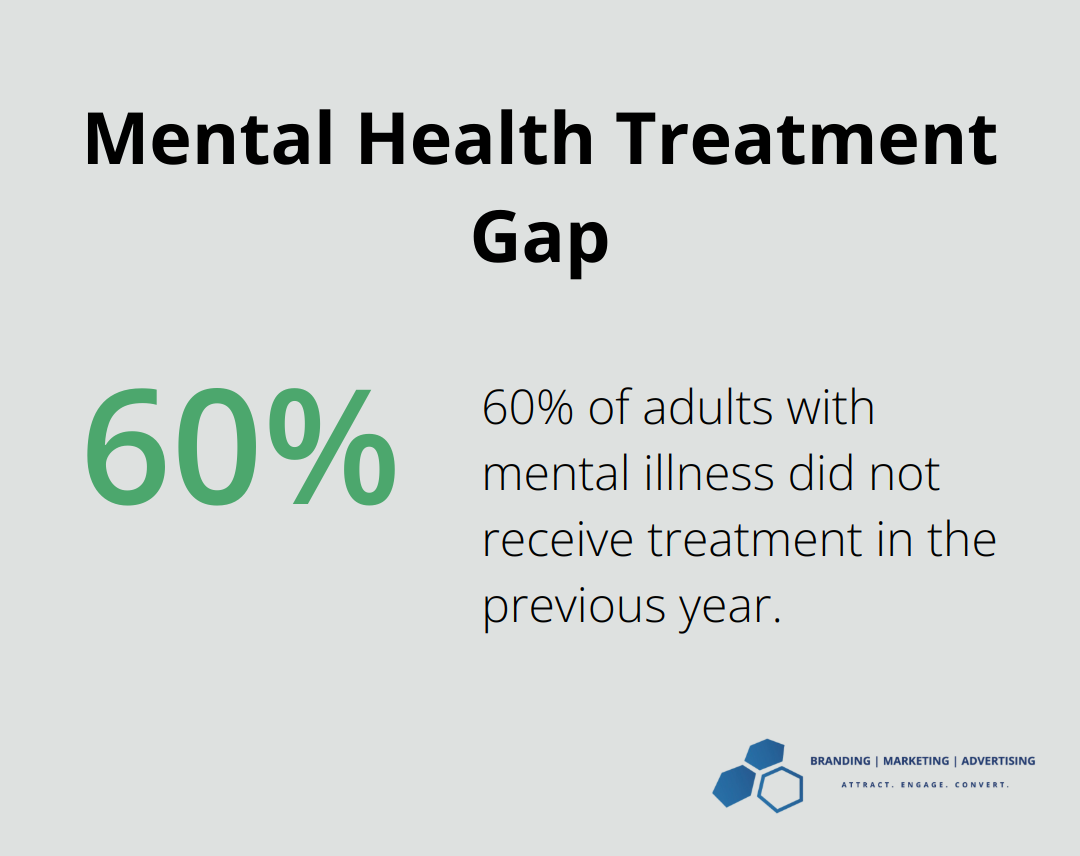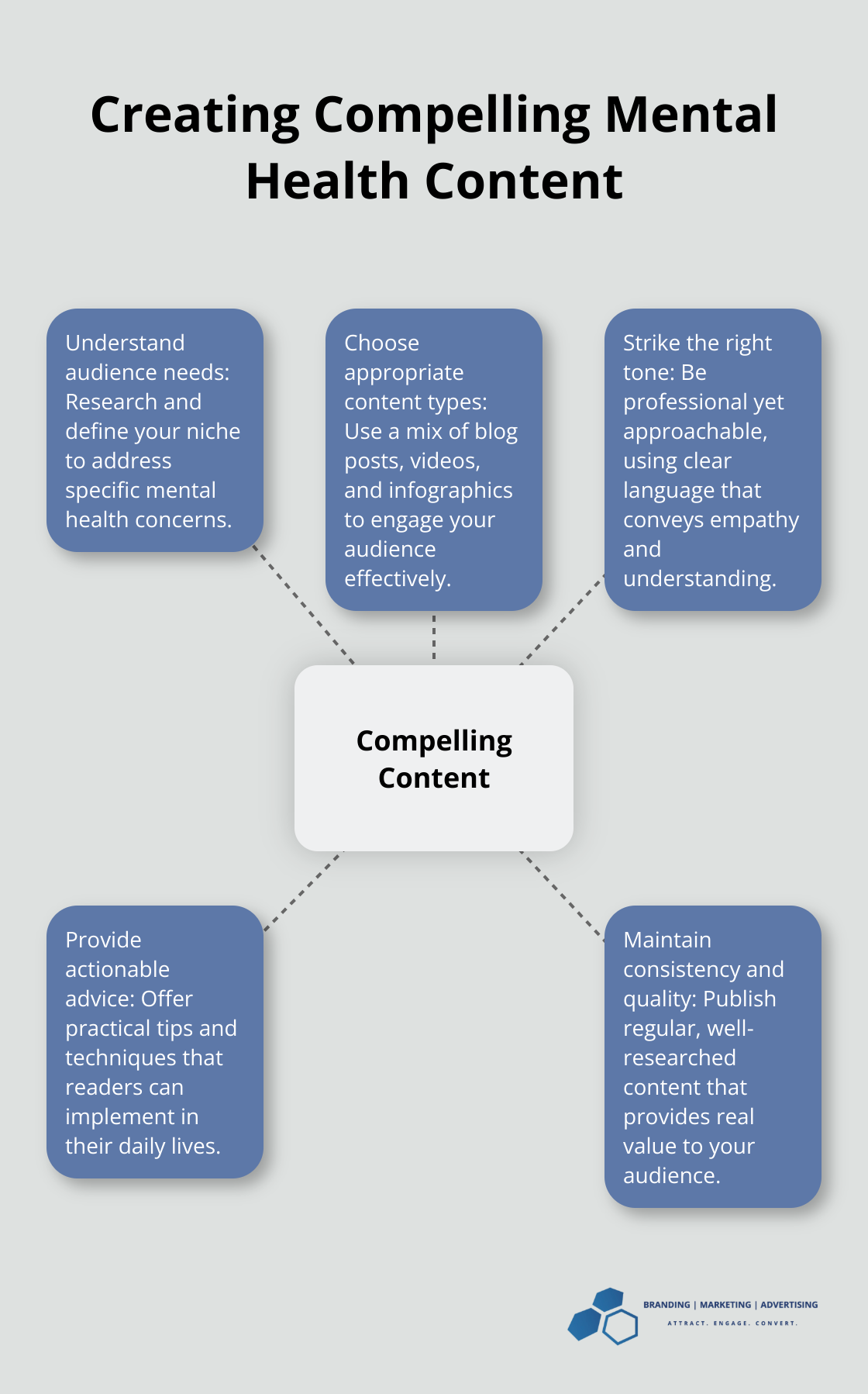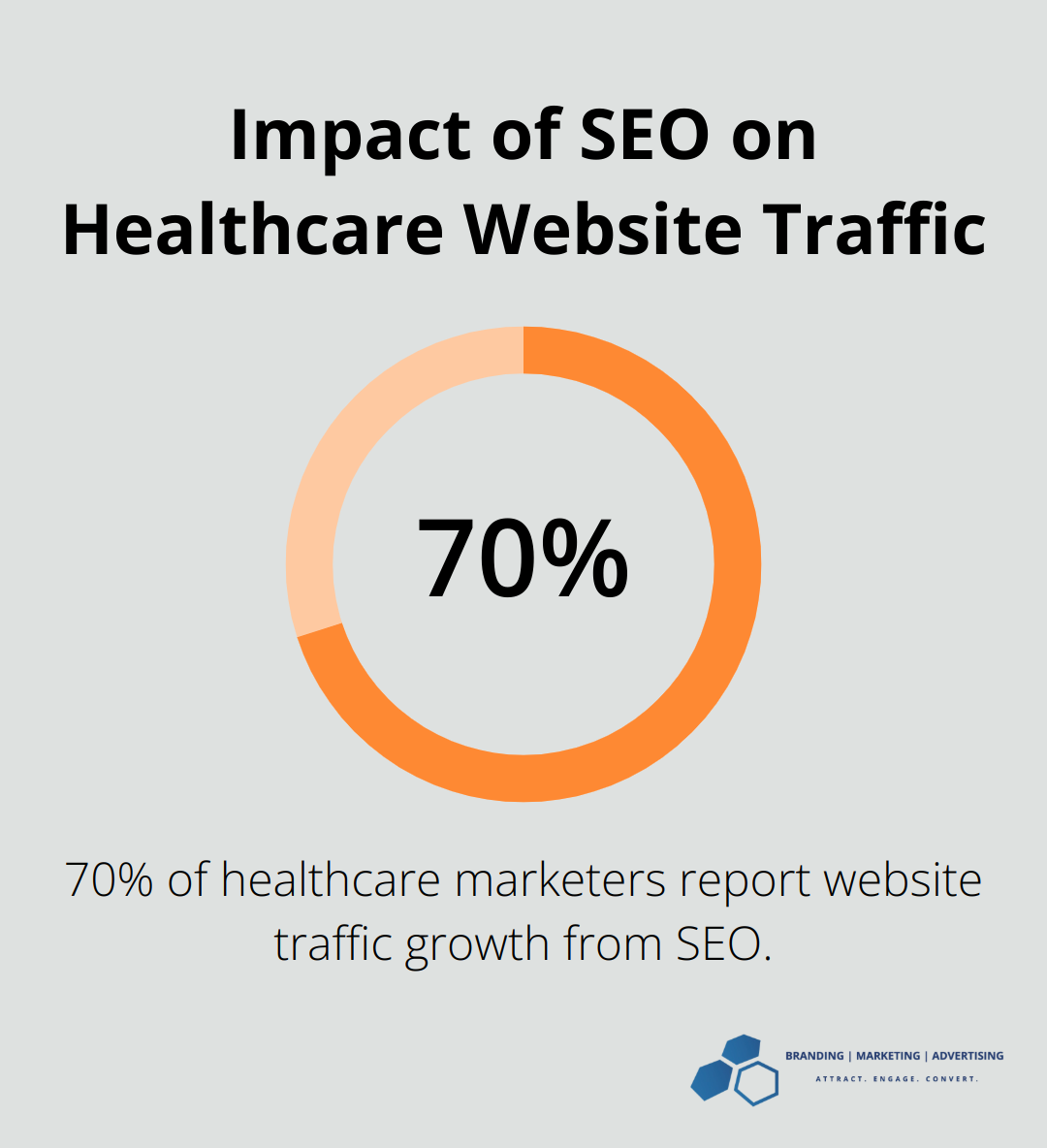How to Master Digital Marketing for Mental Health Pros
At Branding | Marketing | Advertising, we understand the unique challenges mental health professionals face in the digital world.
Digital marketing for mental health professionals has become essential in today’s connected landscape. With the right strategies, you can reach more clients, build trust, and grow your practice online.
This guide will show you how to navigate the digital realm effectively while maintaining ethical standards and professional integrity.
Why Digital Presence Matters for Mental Health Pros
In today’s digital-first world, mental health professionals cannot ignore their online presence. A strong digital footprint is a necessity for reaching and helping those in need.
The Power of Online Visibility
When potential clients search for mental health support, they often turn to the internet first. A study by the National Alliance on Mental Illness reveals that 60% of adults with mental illness did not receive treatment in the previous year. A robust online presence allows mental health professionals to bridge this gap and connect with those seeking help.

Effective Digital Channels for Mental Health Professionals
While numerous digital marketing channels exist, not all prove equally effective for mental health professionals. Social media platforms like Instagram and Facebook serve as powerful tools for sharing educational content and building community. However, professionals must maintain boundaries and adhere to ethical guidelines.
Email marketing remains highly effective, with health-related emails boasting an average open rate of 42.7%. This presents an excellent opportunity for mental health professionals to nurture relationships with existing clients and provide valuable resources to potential patients.
Navigating Ethical Considerations in Online Marketing
Marketing mental health services online requires a delicate balance between promotion and ethical responsibility. The American Psychological Association emphasizes the importance of maintaining client confidentiality and avoiding false or deceptive advertising.
We recommend focusing on educational content that provides value to your audience without making exaggerated claims. For example, sharing evidence-based information about different therapy approaches (such as CBT or mindfulness) or tips for managing stress can demonstrate your expertise while helping potential clients make informed decisions.
Transparency about qualifications and services offered is also essential. Clearly state your credentials, areas of specialization, and any limitations of your practice on your website and social media profiles.
Building Trust Through Digital Presence
Your digital presence serves as an extension of your professional practice. It should reflect the same level of care, expertise, and ethical standards that you bring to your in-person interactions with clients.
Prioritizing ethical considerations in your digital marketing efforts not only ensures compliance with professional standards but also builds trust with your audience. This trust forms the foundation of successful client relationships in the mental health field.
As we move forward, let’s explore how to create compelling content that resonates with your target audience while maintaining professional integrity.
How to Create Compelling Mental Health Content
Creating content that resonates with your audience is essential for mental health professionals. Powerful, empathetic content can make a real difference in reaching those who need help.
Understand Your Audience’s Needs
The first step in creating compelling content is to understand your audience. Mental health issues are deeply personal, and your content should reflect that. Research shows that 6.0% of all U.S. adults experienced Serious Mental Illness (SMI) in 2022, but their needs and experiences vary widely.
Define your niche. Do you specialize in anxiety disorders, depression, or addiction? Each area requires a different approach. For example, if you focus on anxiety, your content might address common concerns and questions your potential clients might have.

Choose the Right Content Types
Different content types serve different purposes. Blog posts allow for in-depth explorations of mental health topics. A study by HubSpot found that companies that blog receive 97% more links to their websites.
Video content is increasingly popular and effective. According to WebFX, video marketing can increase conversions by as much as 80% on ecommerce websites. Create short, informative videos explaining common mental health concepts or offering quick stress-relief techniques.
Infographics can simplify complex information. They’re particularly useful for sharing statistics or breaking down multi-step processes (like cognitive behavioral therapy techniques).
Strike the Right Tone
When creating content about mental health, tone is everything. Your content should be professional yet approachable, informative but not clinical. Avoid jargon that might alienate your audience. Instead, use clear, simple language that conveys empathy and understanding.
Your content isn’t just about showcasing your expertise. It’s about connecting with your audience, offering them hope and support. Share success stories (with permission and anonymity) to inspire and encourage your audience.
Provide Actionable Advice
Your content should do more than just inform – it should empower. Provide practical, actionable advice that readers can implement in their daily lives. This could include mindfulness exercises, journaling prompts, or tips for improving sleep hygiene.
For example, if you’re writing about managing anxiety, don’t just explain what anxiety is. Offer a step-by-step guide on how to practice deep breathing exercises or how to challenge negative thought patterns.
Maintain Consistency and Quality
Consistency is key in content marketing. Try to publish new content regularly – whether that’s weekly blog posts or daily social media updates. This not only keeps your audience engaged but also improves your search engine rankings.
Never sacrifice quality for quantity. Each piece of content should be well-researched, thoughtfully written, and provide real value to your audience. Before publishing, ask yourself: “Will this genuinely help someone struggling with their mental health?”
As we move forward, let’s explore how to leverage social media and SEO to amplify your mental health practice’s online presence and reach more people in need.
How Mental Health Pros Can Boost Their Online Visibility
Maximizing Social Media Impact
Social media platforms offer powerful tools for mental health professionals to expand their reach and connect with those in need. Facebook and Instagram stand out as the most popular platforms for health-related content, according to a study by Sprout Social. These platforms allow you to share valuable insights, engage with your audience, and build a supportive community.
On Facebook, create a professional page that showcases your expertise. Share informative posts about mental health topics, upcoming events, and helpful resources. Use Facebook Live to host Q&A sessions or discuss common mental health concerns.
Instagram provides an ideal platform for sharing visually appealing content. Create infographics about mental health statistics, post inspirational quotes, or share short video tips for managing stress and anxiety. The visual nature of Instagram makes it perfect for conveying complex information in an easily digestible format.
When you engage with followers on social media, authenticity is key. Respond to comments and messages promptly, showing genuine care and concern. However, maintain professional boundaries and avoid providing specific medical advice online. Instead, use these interactions as opportunities to encourage followers to seek professional help when needed.
Boosting Visibility Through SEO
Search Engine Optimization (SEO) plays a vital role in improving your visibility in mental health-related searches. Start by identifying relevant keywords that potential clients might use when seeking mental health support. Tools like Google Keyword Planner can help you discover popular search terms in your field.
Incorporate these keywords naturally into your website content, blog posts, and meta descriptions. For example, if you specialize in anxiety treatment, create content around topics like “managing panic attacks” or “coping with social anxiety.”
Local SEO for mental health providers refers to a focused digital marketing strategy designed to help your practice show up prominently in search results. Optimize your Google Business Profile by including accurate information about your practice, services offered, and operating hours. Encourage satisfied clients to leave reviews, as positive feedback can significantly boost your local search rankings.
Creating Valuable Content
Content creation forms the heart of both social media and SEO strategies. Develop a content calendar that addresses common mental health concerns, treatment options, and self-care tips. Regular publication of high-quality, informative content not only helps with SEO but also positions you as a trusted authority in your field.
Try starting a blog on your website where you can explore mental health topics in depth. 70% of healthcare marketers report the growth of their website traffic owing to SEO. Share these blog posts on your social media platforms to drive traffic back to your website.
Video content continues to grow in popularity and can significantly boost engagement. Create short, informative videos explaining mental health concepts or demonstrating relaxation techniques. Share these videos on YouTube, Instagram, and Facebook to expand your reach across multiple platforms.

Maintaining Consistency and Quality
Consistency plays a key role in both social media and SEO efforts. Update your content regularly, engage with your audience, and monitor your online presence. These strategies can help you build a strong online presence, reach more clients, and make a lasting impact in the mental health field (with time and dedication).
At Branding | Marketing | Advertising, we understand the unique challenges mental health professionals face in the digital landscape. Our team can develop a comprehensive digital marketing strategy that aligns with ethical guidelines while effectively reaching those in need of mental health support.
Final Thoughts
Digital marketing for mental health professionals offers immense potential to reach and support those in need. The key to success lies in consistency and authenticity. Regular, high-quality content creation improves visibility in search results and builds trust with your audience.
Your online presence should reflect your professional values and ethical standards. The digital landscape evolves constantly, so staying informed about the latest trends and best practices will help you refine your strategies. Continuous learning and adaptation will maintain your competitive edge in the online space.
At Branding | Marketing | Advertising, we help mental health professionals navigate the complexities of digital marketing. Our team develops tailored strategies that align with your practice’s goals while adhering to ethical guidelines. To learn more about how we can support your digital marketing efforts, visit our website.












